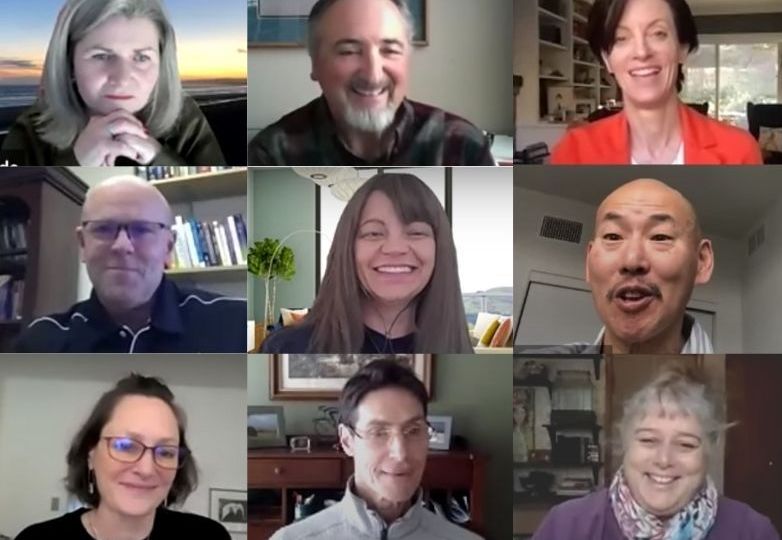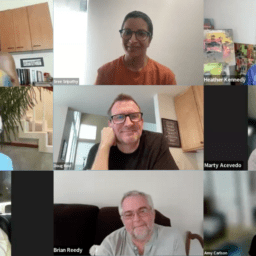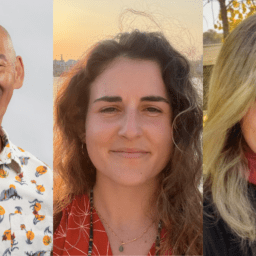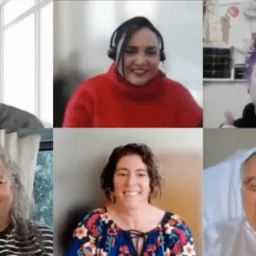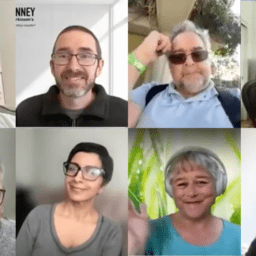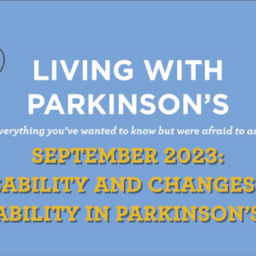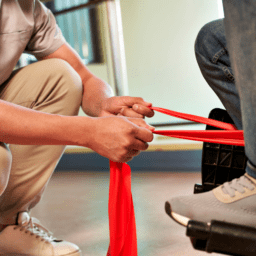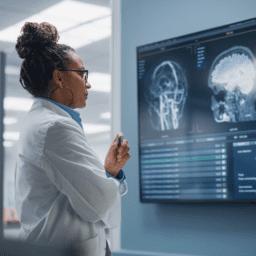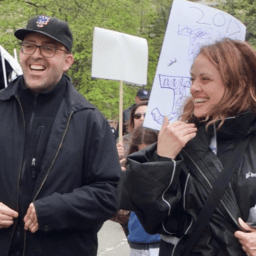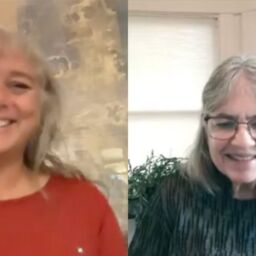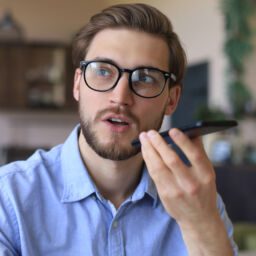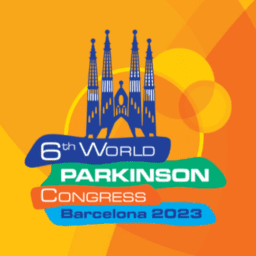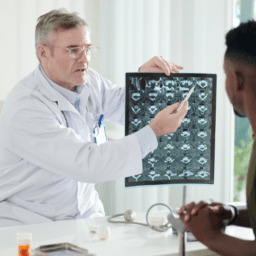Receiving a Parkinson’s diagnosis when you’re young is overwhelming enough as it is. Add the need to exercise daily, attend a variety of medical appointments, and focus on your mental health to an already busy work schedule and it can feel like too much. Plus, if you don’t love your current career path, or you do but the demands exceed your energy and ON time, the possibility of changing careers or shifting roles at your age might feel like a pipe dream. But it’s not.
In this webinar, our YOPD Council leaders will discuss:
- How to evaluate your career with the Parkinson’s lens
- How to evaluate new ideas
- How to use your Parkinson’s community to network and learn about second, third, or even fourth act careers
- How to bring more meaning to your current role
- And more
You can watch the video below.
You can read the transcript below or download it here.
Melani Dizon (Director of Education and Research, Davis Phinney Foundation):
Hello and welcome everybody to the YOPD Council. Our first one of 2021. Very exciting to be back. My name is Melani Dizon. I’m the Director of Education and research at the Davis Phinney Foundation. And we’re really excited to have you all here today. For those of you who are brand new, I just want to give you a quick little intro to this panel. We decided to create this Council last year. I think we have probably done six, maybe six sessions. We do them once a month and if you are here and registered, it means that you will always get the recording and the link and any of the resources that we share on the council. I’m going to introduce you to our members. We have many standing members who are usually with us every month, and then sometimes we have guests and we have a guest today, which is exciting! So, Tom, you can wave and say, hello. Tom is one of our standing members and also an ambassador. Hello, Erin. She’s also an Ambassador. Amy is an Ambassador, and she is in Pennsylvania. Gaynor is calling in from England. So, it’s like eight where you are, is that right? Or nine? Brad is joining us today. He’s going to be talking about careers. He’s done a lot of research around this topic. So, it’s going to be really exciting to hear some of the research he’s been working on. Kat Hill is joining us and she’s from Oregon. Kevin Kwok is here and he is a standing member. He’s also one of our board of directors and he is from Boulder down the street. And Heather, hello. Heather is calling in and she is a regular member of the YOPD Council. And she’s also going to be a regular member of the women’s YOPD Council that is starting the first week of February.
So, I’m going to pass it over to Tom. They’ve spent a lot of time putting this one together, really excited to hear what everybody’s going to say. So go for it, Tom.
Tom Palizzi (Davis Phinney Foundation Ambassador and YOPD Council Leader):
Thanks, Mel. And welcome everybody and welcome to the panelists. And of course, all of you out there. This is something that everybody has to deal with at some point in time, whether you’re young onset or not, but it really applies well to mostly young onset Parkinson’s patients because it happens when we’re either still working or at a point where we need to make some major life changes. So, this is entitled, “How to Change Careers and/or Find More Meaning on your Current Path.” So, in other words, how do you change your direction once you’re diagnosed and if that’s necessary right away and that type of thing. As well, maybe you’re going to keep on working or whatever that might entail for you and how to create better meaning or more meaning on that existing path. So, joining us again today is Brad McDaniels. He’s an assistant professor in the Department of Rehabilitation and Health Services at the University of North Texas. Prior to joining them, Brad earned his PhD from University of Kentucky in rehabilitation counseling, and subsequently accepted an advanced rehabilitation research and training post-doctoral fellowship appointment with the focus on Parkinson’s disease in the Department of Physical Medicine and Rehabilitation at Virginia Commonwealth. So, Brad’s going to provide a very scientific, if you will, background or base for us as we attack some of the questions that we had posted on the internet that invited you to this class or this seminar, sorry. I at first asked a few of our panel members to talk about their journey down this road from being diagnosed and what might’ve happened with them and how they’ve addressed this topic of changing your career or finding more meaning. And I’d like to first invite Kat to talk about her experiences.
Kat Hill (Davis Phinney Foundation Ambassador and YOPD Council Leader):
Thanks. Thanks, Tom. Happy new year, everybody. I was diagnosed at the age of 48 and at that time I was working as the director of a busy inner city midwifery service. Our practice delivered about 60 babies a month. I was doing 24-hour call and also, half of my appointment was administrative. So, I had needed really good multitasking skills and a little bit of superhuman energy to get through my 24- hour call shifts. I I hadn’t been feeling well for some time and I left work without a diagnosis actually and didn’t ever go back. So, I left, went through the diagnostic process, went out on short-term disability, and decided that for me, it was the best choice to kind of sunset out what I was doing and look for ways that I could better take care of myself. I didn’t think that I could manage the demands and manage effectively parenting teenage children, caring for aging parents, and working a full-time job. So that was my decision. And I actually went out on short-term disability and ultimately long-term disability and social security disability. Since then, I’ve sort of reinvented myself and have done a lot of volunteer work in what I call my act two. I’m not going to get too much into that, but it took some time. It took some real grief. It took healing, but I moved on. So that’s kind of my story in a nutshell.
Tom Palizzi:
Thanks Kat, and Amy, if you’d like to give us your background and your story, that’d be great.
Amy Montemarano (Davis Phinney Foundation Ambassador and YOPD Council Leader):
Yeah, so I was diagnosed at age 48, just like Kat, on a Friday. The first person I told after my family was my boss on a Monday. I am a faculty member at a university and the first response that I had to the diagnosis with regard to my future employment, was I felt panic as I’m sure that many people feel. I was lucky in that I met people right away very quickly after the diagnosis who were five years or ten years along their PD journey who were still working. They met with me, we had lunch and that really helped me move from panic to planning. And I think that it’s really, really important to see other people who are still working and still fully engaged. And then when you get to planning, that’s where the work comes in. So, five and a half years later, I’m still working full time as a faculty member. And I had contacted a career coach early on, a career coach who specialized in chronic illness. There are actually a lot of people out there who do that. That led me to get interested in building my own career coaching practice. So, I’ve been doing that for the past four years on the side and learning about the discipline and all the resources out there. It’s been really interesting and helpful and I’m still going. So, I decided to do that on the side, both because I wanted to help people and also because I wanted something that I could transition into if and when I could no longer work my full-time job. So for me, it was a lot about risk management. You know, I needed a plan A and a plan B, and I’m happy to talk more about my story as well after we talk through somebody else’s.
Tom Palizzi:
Thanks, Amy. That’s really interesting because 48 must be the magic number. I was 48 when I was diagnosed as well. Kevin, I asked Kevin to talk as well, and I’m really excited that he did because Kevin’s experiencing what we’re talking about today in real time.
Kevin Kwok (Davis Phinney Foundation Ambassador and YOPD Council Leader):
Well, I guess I’m going to join you all the 48 club because I was also diagnosed at age 48. I’ve been a lifelong pharmaceutical biotech executive. It’s a silly thing, I know, I’m a very simplistic kind of guy. But I had all these grand aspirations of either one day being in the C-suite, maybe even running a biotech company. It was interesting, when I was first diagnosed back at 48, I went through more of a denial period where it was like, “It’s not that bad… you know, I’m doing fine… I can still work my way through things.” Through the course of admitting it over time, I was able to adjust and course correct, but my career trajectory to sort of fit the disease and be able to work. So, I don’t know what the average life span of people who continue working is on this panel, but I’ve been working almost now for 13 years post-diagnosis, but with different roles and different diminishing returns that I will mention. And one of the things that my neurologist at Stanford said to me is “Kevin, Parkinson’s is a disease that is the curse of the type A personality. You know, for all of you, I see a pattern. You all have a certain thing that you’re very driven by either career or unrest. You’re the kind of people that go on vacation that have to do things every single minute.” And her comment to me was, “You know, you gotta step back and actually smell the roses.” Well, I ignore that comment, right? I was like a typical type A. I thought that was for other people, but that wasn’t for me. Unfortunately, my carousel came to a stop three months ago.
Some of you may have heard in previous talks that I’ve given how I’ve been able to reinvent myself from different operating roles to support roles, and to even patient advocacy roles. Some of you have heard me say I had the best job in the world at the very end of my career, which was the ability to talk to patients and hear their stories. So, as I tell everyone, I reinvented myself with Parkinson’s and turned my hobby into a full-time job. Well, two months ago, I was informed, “Kevin, it’s not working.” It’s that one call that you just dread. I was fortunate enough that my employers said we can work on a slower exit with you and counsel you out. But I have to tell you that the last two months have been the hardest of my life. It’s such a blow to take away the lifeblood of people who only think about work as their wellbeing.
And some of you will have also heard me talk about some of my interactions with the sex doc, Dr. Ruth Westheimer. She happened to be a house guest of mine at one time. And she said to me, “Kevin, you men are…” She was very intrigued because I was a headhunter and I used to help people in healthcare find jobs. She goes, “You don’t realize that especially in the case of men,” she says, “If you take away jobs, you take away self-worth.” And she had just published in Forbes, an article called “The Bedroom Recession,” and she says, “Your work affects everything you are. So, for me, I’ve been going through this sort of realization that this Parkinson’s is robbing your relevance. That’s another term that I use. I feel like now I really hit the wall and relevance has been robbed, but I think that what I’m hoping through my conversations with others on this panel is redefining what relevance really is. It’s not necessarily a pay stub. It’s not necessarily a job title, but I’m in search right now of that new relevance.
Tom Palizzi:
Right on, Kevin. Thanks very much. We’re going to migrate into another part of the session here. And this is where we’re going to get Brad more involved in it. We have four topics that we wanted to bring to your attention that are kind of pivotal to walking through this part of our Parkinson’s journey. So, Brad, if you could help us evaluate how our careers might look through the Parkinson’s lens, let’s start with that. And from there we can get the feedback from our panelists.
Brad McDaniels (Department of Rehabilitation and Health Services at the University of North Texas): Yeah. Thank you all for the opportunity. This is exciting to me. And just as a little background…
Melani Dizon:
Hang on one second. Your voice is a little muffled
Brad McDaniels: Sorry, is this better?
Melani Dizon: That’s better.
Brad McDaniels:
Okay. Sorry about that. Parkinson’s is personal to me. You know, my mother was diagnosed almost nine years ago now, and that was my impetus for going back to graduate school. So I went back late in life and got my PhD with the sole focus of how can I help people with PD. So just a little background about me and, you know, as we think about this, what we’ve heard from the three panelists evaluating one’s career at diagnosis, you know, the one common denominator that I heard was fear, right? Fear of the unknown. What’s next? Do I have to tell my employer that I have PD? If I do, what do I say? How do I disclose? The quick answer to that is no, right? We don’t have to tell. The only time that you really need to tell an employer that you have a chronic illness is if you are going to ask for accommodations on your job, obviously then, you need to disclose to them. And one of the things that I talk to groups regularly about is, what does disclosure look like? How do we go about that?
And it’s really, in a nutshell, talking about the things that will functionally impact your job and what can be done about it. So, I think, that as someone on here who may be thinking about this, who may be experiencing this right now, those are some things to think about. What do I need that will help me perform my job to the best of my ability? And if you choose to disclose, be honest about it. And I guess probably the one good piece of advice is talk in layman’s terms. You all know the medical terms that are associated with Parkinson’s disease. Many employers, if you say dyskinesia, they’re not going to have any idea what you’re talking about. So tell them things in their language that will impact your work. And I think that you’ll find the response be very different in doing that.
Tom Palizzi:
Thanks. Anybody want to comment on that? Or have anything to add? Amy?
Amy Montemarano:
Yeah, I’ve done a lot of research about this too. And there are some really good free services. I know Brad works with some of those vocational rehabilitation organizations, but there’s also, a nonprofit/ government, kind of like a quasi-government organization, called Ask Jan. The Job Accommodation Network is what JAN stands for. It’s askjan.org and it’s staffed by people who are social workers and I think lawyers and other professionals who have been working in this area of accommodations for a really long time. When you call them, they are so helpful, and they are so experienced, and they treat everything confidentially, and they will talk you through exactly what Brad’s talking about. You know… Do I have to disclose? How do I disclose? What can I ask for? What’s the timing? And they’ll even give you sort of a template for the letter that you need to write. It’s a really, really good resource.
Tom Palizzi:
And what I found kind of interesting was meeting Brad, as we started to prepare this webinar, I wished I would have known these things then that I’m learning here now. So that’s been really kind of an interesting point. I think for me, it was about looking at what I really could do from this point on, and I worked for about another eight years after being diagnosed. Then it just came to a point where it was obvious to me and my boss, who was really good and easy to deal with on this whole exercise in that part of my journey. It was pretty obvious that it was time that I stepped down, and I played an active role in that whole thing. That’s what I always encourage people to do. You know, talk to your employer if you’re on those terms. Some people just aren’t on good terms with their employers and I realize that’s kind of difficult. I don’t know if anybody on the panel had any of the experiences like that they’d like to comment about, but if you do…
Kevin Kwok:
I think that the comment that you had Tom on doing things on your own terms is the thing that we all wish we could do. Not everyone has that luxury. We’re not all co-founders. We work in big organizations with other people, but I think part of this disclosure is the hopes that you get a champion within your company that will help you navigate the next steps. And that’s not always the case for everybody out there. So I think that’s the challenge, right?
Tom Palizzi: Definitely.
Melani Dizon:
Gaynor, did you want to jump in there?
Kevin Kwok:
Gaynor, you’re muted.
Gaynor Edwards (YOPD Council Leader):
Ugh, fingers don’t work! I think that’s the double-edged sword behind it, isn’t it? You know, you want to keep working or you’re fighting with this contradiction that you want people to understand your condition and at the same time you want to be as normal as ever. I think an awful lot of people are stuck and, you know, you want a champion, you want someone within your business who’s going to understand your condition, but then that involves you coming out about it properly.
Kevin Kwok:
The phrase that I use, Gaynor, is that when you have Parkinson’s, you don’t fake your illness, you fake your wellness. You tell people everything’s okay and you volunteer. You take on more than you really should probably do. And I think it’s a double edged sword that also comes back to bite you by doing that, living that world as well.
Gaynor Edwards:
It’s that Type A personality again, isn’t it, Kevin? That type of personality is not going to say I can’t actually do this. You have to monitor your own health and what’s good for you and those stress levels certainly are not good for you.
Kevin Kwok:
My guess is everyone on this panel has a hard time saying no.
Kat Hill:
I also think that it takes the ability to ask for help. And I think that that may be something else that for me, it would have meant having to ask my partners to step up and do more. And we couldn’t just leave labor and delivery not covered. I just couldn’t do it. I couldn’t see myself doing it and asking the question.
Erin Michaels:
Yeah. I wanted to add too, from my own personal career perspective… I did switch jobs after I was diagnosed, but went into a similar field, just at a different company and I’m thankful for that. The company that I work at is a B certified core company or B Corp certified company. It’s a new movement across the globe where to become B Corp certified, you have to adhere to a certain level of social responsibility and environmental responsibility. So, part of that, that my company does, is that it includes ADA type of things. They’ve been very open with me and dialoguing with me about what my needs are, almost to the point where I’m canceling meetings with them, because they’re over accommodating me at this point, which is great. But, just from a thought perspective, if you are looking to switch careers, they do have a listing out for all the companies that have been B Corp certified or are working towards it. And they are, I think a little more, I don’t want to say open to working with people with disabilities amongst other things, but they definitely approach it from a different perspective.
Heather Kennedy (Davis Phinney Foundation Ambassador and YOPD Council Leader):
I just did some research, because I vet sources for a living for my other job, and I just did research on B companies to verify that the companies listed in the article were B companies and I got a whole education. So thank you for doing that. The sustainability alone is lifting the vibration and changing the workplace. It’s really a dynamic thing.
Erin Michaels (Davis Phinney Foundation Ambassador and YOPD Council Leader): Yeah, I’ve got a great company, no complaints.
Heather Kennedy:
Congratulations. I wanted to also echo what Brad said about the translations needed to come out in your workplace. When I tell people I have Parkinson’s, they’re like, “You’re so young,” or if I start a dialogue where they can’t see who I am, they immediately assume that I’m over the age of 70. And they start talking from that point, which is always kind of tricky because I look at the career path much like I do the dating world. We want to be healthy and vibrant and show our best side, but we also might need disability and so we don’t want to leave out the reality that we are really increasingly disabled. And that reality is very real. And it’s hard to show that on camera, it’s hard to be vulnerable. I’ve made my last ten years about showing that transparent part of me. That hasn’t always gone well. Showing that transparency online requires a lot of bravery. You have to be bulletproof. People are gonna come at you. You’re gonna be shot at from every grassy knoll. Whether you’re showing your good side, like, “Hey, today I can box, I’m so happy,” or “I can barely do this.” So we want to get hired, but then we also might not be able to do everything. It’s a really tough line to walk. And Brad mentioned, you know, translating that to your employers is so important and engaging in being your own advocate. Kevin mentioned that we want somebody to stand up for us. We might not always get that and we can’t count on it. We have to find ways to be our own advocate in that. So, I just want to add all that, thank you.
Erin Michaels:
Yeah. And that’s a very good point. That’s a very good point, Heather, I think it’s difficult for companies and organizations, regardless of where you work and your coworkers, to understand that your symptoms vary from day to day. It just doesn’t make sense to them, you know, and you can fall into the whole catty bit, “Well, she was fine yesterday. What’s their problem today? Why can’t you?” It’s just a lack of understanding. We just have to look at those situations as learning experiences for the other people and try. As much as it hurts you and rips your heart out as it’s happening to you, try to educate somebody on the reality of your situation and remind them how thankful they should be that they’re not in your shoes.
Tom Palizzi:
For sure. Hey, Brad, can you start us off on how to evaluate new ideas?
Brad McDaniels:
Yeah. I just want to add one more piece to the previous discussion that comes up from time to time when I’m talking to patient groups is don’t bring up ADA when you’re talking about your accommodations, right? Because frequently people will have the mindset that yes, I have this protection under the ADA, and I’m going to tell my employer or my HR person, and they have to comply because of the ADA. That’s a touchy subject. We know what the law says, but there are ways around that. And it’s a great way to begin the conversation in a very negative tone. So, I always throw that out there because we just don’t want them to make that mistake up front.
So, evaluating the new ideas, right? We’ve heard some already from the panelists about how diagnosis comes, and you’re kind of making those decisions about, do I remain in my current work setting or is it time to change? You know, if I work in construction and I’m having gait issues, it may be time that I find a different occupation, right? It’s safer for me to work. And one of the things that, again, as I share with many groups, that’s available, is the Office of Vocational Rehabilitation. A whole lot of patient groups have never heard of this. And it’s a fantastic organization that’s around in every state. It’s federally funded. It’s operated in each state and it is an office that’s designed to help people with chronic illnesses and disabilities through the process of finding work. And that’s a very broad definition because what they do is they help with interview skills, assessments to find out what your interests might be and what your skillset is to help you choose a different job. They will help with assistive technology. If you need some help with something, they will help with accommodations.
So, it’s a wonderful organization. I forwarded on a link to Mel, that they can probably put in the chat, as a way to find who your vocational rehab office is in every state. And it’s called AskEARN. It’s a wonderful resource to be able to sit down and talk with one of these professionals and this is what they do. They understand disabilities, they understand chronic illnesses, and they can help answer questions. You know, you guys are such a tremendous resource. I would bet that based on what Tom said earlier, having had some of this information at the time of diagnosis would have been invaluable. So, the hope is that some who may be on here, who haven’t gotten to the point where you all are on the panel, can use this. And it’s another piece for you all to have in your tool bag. When someone asks you, you can say, “Hey, have you reached out to the office of vocational rehab or not?” So, I wanted to share that as you’re evaluating ideas, because they’re great to bounce things off about here’s my skill set that I have in my current job, how might that translate to something else? Is it possible for me to change jobs? Or what do I need to do to stay in my current role? Just a few thoughts on that.
Tom Palizzi:
Yeah, thanks. I think some of what impacts that of course, is really the bottom line, which in most cases, is money. And I thought we talked about this before the meeting, before this presentation, but you know, how do we deal with that 800-pound gorilla in the room of having to have an income or some way to sustain yourself? So, I don’t know if you guys on the panel have any comments about that, but I’m sure some of you do.
Amy Montemarano:
Yeah. So, the work after the diagnosis is really important and I think it involves both external and internal work. And the external work has to start with an honest assessment of your financial situation, because any decisions after that depend on that first one. And I do think that if you start moving forward, thinking about what you want to do without taking that first step of this really honest inventory can lead to more anxiety, because you don’t know if those things that you are now evaluating are even feasible. So, it’s a really hard thing to do. And there are lots of decisions that you have to make because of whatever your assessment comes out to be. But, if you do it, and I think Kat talks about this too, from there, you can have a little bit more peace of mind about what your options are. I don’t want to echo what everybody else is saying but I think it’s really, really important to not see yourself as a victim in this process. It’s really important to feel like you have some agency and some ownership and some control over what you can control, because you cannot control the fact that you have Parkinson’s, that’s a given. So, the question is, given that I have Parkinson’s, what are my options now? And it’s really difficult to move forward if you feel like things are just happening to you and you don’t have any choices. The choices are not gonna be the ones that you want, but they are choices. And I do think it’s really important to find your power in this inquiry.
Kat Hill:
Yeah, I’d love to echo that, Amy. Sometimes when you’re in the throes of just getting a diagnosis, that is probably not the best time to make the really big decisions. If you can take a little bit of time and feel all the feels and then get your head around it a little bit. For me, it meant sitting down and getting creative. You know, my husband and I sat at the table and we put everything out on the table. I was the primary breadwinner. My husband works, I just was blessed to have a really a nice income. And we laid it out and said, you know, we want to stay in the house if we can, how can we do that? And we both agreed that it was the best plan for me to leave work. And it meant getting creative. You know, we rented out part of our house. We’ve gotten creative about how we finance trips. We put out kind of what were our baselines, and could we meet those needs other ways? It’s been six years since my diagnosis. You know, I’ve qualified for social security disability, which helps. It’s about a quarter of my previous income, but it helps. And I think you have to weigh it. And I think you’re absolutely right. If you make decisions, you quit your job, you check out a life. Once you’ve gotten through the other side of the diagnosis and the acceptance, it’s hard to know what to go back to. And there’s lots of things that I can still do. And lots of ways to explore. It’s not all about making money. It’s about being of service for me. It’s about showing up. It’s about trying to talk about joy and resilience, despite a diagnosis. And that’s how I define my worth. Now, it’s not just about the paycheck. Although I miss catching babies, delivering babies was wonderful, it’s somebody else’s turn now. I don’t want to drop any babies. I never dropped any babies Parkinson’s or no Parkinson’s. So those are my thoughts.
Heather Kennedy:
I’ve noticed that people who reach a certain age like to translate things in a different way too. You just said, you want it to be of service. I would say we would all agree with that. That is such an important point. I think that’s just big. And as a silver lining to add to your travel comment, you now have friends in every city. We have new friends in every city.
Tom Palizzi: Yeah. So true.
Kevin Kwok:
Yeah. I will say that this panel, all of you I’ve spoken to offline, you guys have been my saviors, and I hope that the Parkinson’s community all reaches out to someone else because they’re not alone here. It’s really daunting when you’re looking forward. And someone said, fear is the unknown, to think you’re going at it alone. And I don’t think you necessarily can count on your fellow colleagues and employees to be your best friend through all this. They tire, they fatigue over all these issues. They pick up your slack and after a while, they sometimes will not be there. But I feel like any one of you, I could pick up the phone and call. You would say, “Kevin, I’ve been there. I get it.” So, I thank you all for that.
Tom Palizzi:
Kevin, that’s a good segue into the next major bullet item, which is how to use your Parkinson’s community to network and learn about second, third, even fourth act careers or what I call my twilight careers. So, thanks for kicking that off. Brad, do you want to help us with that one?
Brad McDaniels:
Yeah. There’s just one thing I wanted to share that is one of the things that keeps me going, talking about YOPD in particular and employment. I did a study when I was at UK, looking at, do people with Parkinson’s disease want to work? Because it was a question that needed to be asked. I had done a lot of work with multiple sclerosis, which is, you know, we’re talking about a young age population who have employment impacted. And so, I submitted this grant to the national science foundation and all three reviewers who responded to my grant, said, people with Parkinson’s disease don’t want to work, three out of three. And it blew me away. I mean, and I see laughing on the panel right now because you guys know. But part of that is some sad truth. I have talked to movement disorder folks who believe the same vein, and the research I did found that 60% of the people I surveyed said, I want to work at least part-time. And for many, it wasn’t just about the money. That’s a component clearly. But for many of them, it was about the social interaction, the getting out, being active, moving, avoiding the apathy, which is a real issue with people with PD that we know about. So, I just wanted to share that because I knew that those of you on this call would find that interesting. But, thinking about the networking, right? And as I listened to you all interact, those of you who have gone through that initial stage of the diagnosis, shock, fear, uncertainty, all of that. Thinking what do I do with my career? How do I move forward? It places you all in a very unique and good position to influence and guide those who you will come in contact with, who may be on this webinar right now saying I was just diagnosed, what do I do? And, you know, that’s one of the great things.
When I think about support groups and what we know about most employment research in our country, is that most jobs come from someone you know, and someone who has connected you. This social capital that we have through one another and people who can guide you through this process and talking about the B Corp companies. Companies who have a different view of hiring people with disabilities is a big deal. And those companies are out there. You can find them. There are several who, when I was getting my graduate work done, we would help people get to those companies because we knew that they had a favorable view. So, I think, you know, doing as much as one can to interact with someone else who has PD and asking those questions, telling someone when you’re afraid, what you don’t know how to do, how did you do that when you were going through, how did you talk to your employer when you explained those things and needs that you have. And I know that in the short time that I’ve been interacting with you all in the last few days, clearly that’s an important component, right?
Watching you guys interact and talk about your work lives and about the changes that you encountered as a result of PD. So, it’s one of the things that I think is valuable and it goes across whether one has a disability or chronic illness or not. This networking component with life. And with understanding where we fit in life is extremely important. And, you know, I’d be interested to hear how you all have used networking to answer some questions.
Gaynor Edwards:
I think we probably network now more than we ever did pre-Parkinson’s. And there’s something which is pretty much the Parkinson’s perspective, which is as you get towards acceptance, it’s important for us to work, because we want to maintain some kind of sense of normality, I think. At the same time, less interested in the money side, because we realized that isn’t the important bit. You know, you’ve already had the rug pulled away, you’ve had this huge bit of news and money is not going to make that better. And yet with money and responsibility, there is the stress of that as well. I think Michael J. Fox said that he had to give up his day job to do his life’s work. So, there is absolutely something about that. I mean, I did it, I was doing what I did, I was doing the PR and marketing bit, but I didn’t see the relevance of doing it for ordinary companies anymore. But doing it for my own charity, I see the point of that.
Heather Kennedy:
I also want to add that I work in a community outside of the Parkinson’s community, because I have a couple of different little jobs that I do. And it includes a lot of BIPOC people, which is black, indigenous, people of color. And we often talk about how networking, that’s everything. All the people that I interact with are saying, just invite us to the table. And if I may just make a parallel here, even though those two communities are nothing alike, with the disabled community or with people like us, who have many disabilities that don’t show, all we want is to be invited to the table. This is why my work with Anders and Norway and all the films we’re doing is so important. We want the world to see that we’re not all the same. We’re not just that shaky image that you see if you google Parkinson’s anymore, we are a diverse community. And we do have different skills that can be very useful. If you think about diversity in the workplace, it makes the company better in every single way by adding different views. And I don’t know about you, but if I see two companies’ side-by-side competing, and one of them hires a lot of people like me, I’m going to go give my money there.
Gaynor Edwards:
And sometimes you have to just take the seat, Heather. Don’t wait to be offered the seat at the table, just go get it.
Kevin Kwok:
Steve has a comment.
Steve Hovey (Davis Phinney Foundation Ambassador and YOPD Council Leader):
Oh, okay. Yeah. Going back to what Brad said. I was diagnosed 14 years ago and, and there was not the support network at all like there is now. My situation was a little bit different where I own my business and it was kind of my call as to when I thought the time was right to stop. I wish I had somebody to talk to. I really felt, and this was before I met the David Phinney Foundation and then my world changed of course, and I mean that seriously, as far as my Parkinson’s world, I felt alone. I didn’t know. Do I have five good years left? Do I have ten good years left? Can I do this for two more years? You know, the responsibility of owning a company, running a company, having employees. So, my angle was a little bit different. I wish there was somebody that I could have talked to back then, because I always wonder, did I sell my business too quickly? Because I remember when I did do it. And then I was working for the guy I sold the company to for a three-year transition during the buy- out. I really had a hard time letting go. Though I wasn’t working as many hours, I almost wanted to keep working. So, I still had it in me. So, having somebody to talk to on that end of it, or the end of it where you’re employed and you’re leaving. It’s just so valuable to talk to somebody that’s gone through it. I mean, it all worked out great. And now, you know, where my purpose then was, running this business and having it be successful, my purpose now is, doing all the volunteer work. I said, you know, someday when I retire, I’m going to volunteer for this and this and this, and now I’m doing it. And I do love it, it all worked. But, to piggyback on what Brad said, I just really think having a network, not being afraid to reach out to other people is so important.
Melani Dizon:
Yeah. I just want to ask one question, because you all have very different situations that you’re in right now in terms of your workday and your work schedule. Some of you work full time. Some of you are not working. But I know one of the questions we often get and that we’ve gotten in the chat, is that having Parkinson’s can feel like a full-time job between the PT and the doctor and the exercise and the classes and all of those things. Then to work on top of it, it feels really overwhelming. So, for those of you who are working full time and are doing classes and making sure you exercise every day, how are you doing it? What is some advice that you can offer to some people that are struggling with that? Yeah, Erin.
Erin Michaels:
Yeah, I’ll start it out. So, I’m super type A and super competitive just in life in general. So, the one thing that I had to do was get rid of guilt. So, when I had to take a nap or take a half an hour to go for a bike ride, I had to stop feeling guilty that I wasn’t doing work. And I was like, ‘Oh my God, somebody is going to be looking for me and they can’t find me. And they’re going to think I’m slacking’ and so just realizing it’s okay. Nobody where I work now is judging me on that stuff. I have to take care of myself first, before I can take care of my company or my clients and customers. So, it was a hard thing for me to come to that conclusion. And you know, I still struggle with it here and there, but it’s okay to take a break in the day and not be full-on for eight consecutive hours. Some days I may work four or five hours. Some days I may work 12, but you know, the end result is we’re all adults. We all know what we’re responsible for if we do have a job. And as long as you can get that work done, you just have to be with okay with how you structure your day to get the end result.
Tom Palizzi:
Anybody else working out there?
Heather Kennedy:
I was just going to say that ultimately, we are all in a very expensive war with our nervous system. And that includes, did I mention expensive? So, the only reason I’m here in this home, is because of my ex-husband. Most people can’t do this and especially not alone. It’s very hard when you have a single income or no income suddenly, to try to readjust and get that footing, let alone the philosophical things that I’ve mentioned and all the friend changes and the relationship changes and everything else. None of this is happening in a vacuum. It hits us from all directions at once. It really is like a Holocaust. And here we are holding up these little umbrellas going, we can do this, we can do this, but without each other we can’t, because we learn everything from each other. So this is invaluable for sure.
Kevin Kwok:
Yeah. I do think you have to think about sometimes the realities of downsizing or living a life a little bit different than what you lived before, you know, pre-Park. And since, I mean, I’ve had to adjust twice and somehow every time I readjust, there’s a little bit of relief, like, ‘Oh, I don’t have a huge mortgage now,’ or, ‘As each of my kids graduates from college, I get a raise.’ Right? Those are the things that you really look for, those midstream adjustments in our lives.
Tom Palizzi:
Yeah. Thanks Kevin. That interesting. And I know all about those raises that you get periodically, so that I know is nice. Okay. There’s 10 minutes left in the webinar and there were two things I really wanted to talk about or get out on the table. One was, what is it that you’re doing today, panelist members? If you’ve made that transition, what exactly do you do today? What are you? What is your twilight career, your act two, or act four? And then, I wanted Brad to comment about how to bring more meaning into that current role, not just with people that are working, but people that have made the change. There’s purpose to bring meaning into that as well. So, Gaynor, I want to start with you, but what are you doing these days?
Gaynor Edwards:
I’m doing this, largely. So yeah, it was writing about another firm of accountants and doing the copy for their website was not going to sail my boat anymore. And yet it was screaming out that someone needed to represent young onset Parkinson’s. So, I launched the UK’s only dedicated YOPD charity. And I think the only one in the western world that’s dedicated to YOPD, although Davis Phinney does a fabulous job, obviously.
Tom Palizzi:
As I kind of go around my screen, I was in marketing as well. And what I’ve been doing since I left work four years ago is primarily this, my work as an ambassador with the Phinney Foundation, but I also run an annual fundraiser bike ride on an annual basis. And then I do a lot of work for, Pedaling for Parkinson’s. Some of you may know that. I’m helping that organization get re-established and become more prominent. Then there’s a host of other things. I do some lobbying work for government. So, I do a lot of things. I’m taken back by what Michael J. Fox said, “I had to quit my day job to do my life’s work.” I kind of feel the same way. So Heather, I know you do a lot of different things.
Heather Kennedy:
Like improv. Hi! I feel like we have to be in improv, which is why I bring that up jokingly, but, you know, there’s truth in jest. There’s no way to do this pre-planned because our world is constantly ending. We deal with so much grief and loss and there’s no way to calculate or anticipate some of that loss. It really is the end of our world. So, I go into like Pema Chodron’s, The Places that Scare You, or When Things Fall Apart. And I lean on some of my spiritual teachers, because I don’t know where to go. Without my comrades here, without the collective of the international Parkinson’s community, I wouldn’t have any answers because, you know, you only have about 15 minutes with your doctor a couple of times a year, if you’re lucky, and we don’t know where to go in our own communities. If you’ve ever been to a local support group, you might find that they’re mostly people who happen to be of a certain age, that is, not your age. So they’re just in a different part of their lives. They’re just not as interested. So, this YOPD stuff is so vital for our success and for just surviving, you know, it’s just, it’s vital. Thank you.
Tom Palizzi:
Thank you, Heather. Kat, what are you doing?
Kat Hill:
Well, sometimes I feel I’m working harder than I was at the other job. But I have a little more control over it. I’ve, let’s see, I’ve started a podcast. I’ve written a book. I’m speaking internationally. I’m on a lot of committees. I try to be a good friend and resource for people, and I love it. It’s very meaningful for me.
Melani Dizon:
And you get to take care of your grandkids!
Kat Hill:
Oh, yes, I get to take care of my great niece. Every Tuesday is the Freya day. She comes and plays. She is two, and man, she’s two, so that is a gift.
Tom Palizzi:
That says a lot right there… Erin?
Erin Michaels:
Yeah, so pre-diagnosis, I was in sales. Post-diagnosis, other than this, took a career shift and I’m a VP of commerce strategy for a global consulting firm with a focus on human centered design and design thinking. I’ve been able and fortunate enough throughout my career to form a lot of lasting relationships. So, I look at disabilities a little more broadly and leverage the relationship I had in the past with SAP, which is a big technology company, for those of you who don’t know, and I was working with them to do the inclusive inclusivity for New York fashion week about a year and a half ago for children who have wheelchairs and things like that. And it was called “Fashion for All.” So, getting involved in a bunch of different types of things that are more human centric versus being a salesperson and being all about the money. So, definitely a better fit.
Tom Palizzi:
Thanks, Erin. Steve, what are you doing?
Steve Hovey:
Well, I’m doing as much as I can to help the Davis Phinney Foundation when they call on me. Also, for about five years now, I’ve been a mentor, a business mentor for small businesses through an organization called Score, which is a national organization. That keeps me pretty busy. I’m also on a committee in the town of Saratoga Springs, New York, which we’re about 40,000 folks and the committee is on addressing racial equity and equality in the workplace with local business. So, that’s been keeping me busy and then trying to get a workout in here and there.
Tom Palizzi: Kevin?
Kevin Kwok:
Well, you know, during this transitionary period, I gained strength from taking calls from someone recently diagnosed with Parkinson’s, where I can offer advice or just sort of my experiences, advice is a little bit rich to say. But I find that giving back in that way really helps me a lot. I also play patient advisor to a number of organizations, which helps me again feel like I’m giving back to the cause right now and helping our tribe. While I’m trying to still discover what’s next, this is what’s bridging me through all of that. Then the exercise, the exercise takes a lot of time. I mean, between that and daily meditation, pretty soon it’s 10 o’clock in the morning or 11, right?
Tom Palizzi: Amy?
Amy Montemarano:
I’ll be really quick. So, my zoom kicked me off. I’m assuming that you’re asking what we are doing post-diagnosis that’s more meaningful? So, I’ll be really quick. Davis Phinney has been so helpful in this area and just being an ambassador and having people call, like you said, Kevin, it feels good to be useful and to be a PD mentor for people. That’s what I’ve been doing. And also in the spring, I’m helping, also through Davis Phinney, administer I guess, I’m not the one training, but, we will have a trainer who is training anybody who’s interested to do a triathlon in May and I’m going to help him. His name is Frank. That’ll be fun.
Melani Dizon:
Yes, we are super excited about that. Very excited.
Tom Palizzi:
Mel, do we have time for a Brad to put in some final thoughts?
Melani Dizon:
Yeah, sure. We have a guest again today. So, Brad, you wanna wrap up with some important final thoughts?
Brad McDaniels:
Very quick, yes. You know, one of the things that I saw when we started talking about this was talking about meaningful work, right? What does that mean? That’s become a construct that’s being studied in the social sciences right now. And the question is, how do we define that? What is meaningful work? And clearly it’s a subjective thing, right? But Michael Steger is the guy from Colorado State University who has been studying meaning in life and meaningful work for the last decade and probably is the foremost expert. And he’s talks about it being any paid or unpaid occupational role that gives us meaning, purpose and significance in our life. And, you know, it helps when we are our authentic selves, it increases our self-esteem, we have purpose, we feel belonging and it transcends who we are as a person and helps us have a greater cause. So that’s kind of the real brief picture of that, but it’s an area of great importance.
Tom Palizzi:
Thanks, Brad. I can’t thank you enough. It’s been a pleasure meeting you and working with you on this and, and I’m going to kick it back over to Mel. It looks like she just ran out to get our mighty guest… Oh and who could it be? Davis. How are you?
Davis Phinney:
You guys are so great. Thank you so much. So much wisdom and thoughtfulness and Brad, it’s great to have you as part of the conversation today. So, thank you all. It’s great to see you. And Gaynor, thanks for your shout out.
Gaynor Edwards: You’re welcome.
Kevin Kwok:
I just have to say, Davis, thank you for giving us this opportunity.
Davis Phinney:
I mean, it’s really Mel and Polly and the whole team here at the Foundation that do the heavy lifting. I just come in as the frosting occasionally, but anyway, you guys are terrific. Thanks so much.
Heather Kennedy:
Thank you for getting me out of my fuzzy blue robe and my slippers. You’re the only reason I’m out of my blue robe, I appreciate that part especially.
Davis Phinney: Anytime.
Gaynor Edwards:
Are you wearing your slippers now? {Heather shows slippers}
Melani Dizon:
Thank you to everybody who joined us today. Davis, thank you for joining. If you’re on this call, it means that you’re going to get the recording of the video and the audio and the transcript and everything that you need. And we’ll be back next month as always, the third Thursday of the month at one o’clock every time. And if you guys have ideas for something that you would like this YOPD council to talk about, you can definitely email them to me at this address. mdizon@dpf.org, if you have some topics you’d like us to talk about, we will do that. Thank you all so much for being here and thank you for this council for just bringing so much energy and life and a spotlight, as Gaynor would say, onto YOPD and it’s very necessary, so thank you all so much.
To listen to the audio, click here.
Show Notes
- Many people with young–onset Parkinson’s disease (YOPD) are still working a full-time job and are financially responsible for themselves and/or their family when the symptoms of Parkinson’s begin to appear
- After a YOPD diagnosis, take time to re-evaluate your ability to meet the expectations of your current position. A beneficial first step can be connecting with a professional who can help you navigate the process of requesting accommodations or applying for disability benefits. Expert guidance can help you determine if, how, and/or when to talk to your employer about your diagnosis
- Maintaining financial stability is a primary concern for many people diagnosed with YOPD. Disability insurance may provide some financial assistance
- Because B-Corp certified companies must adhere to a certain level of social and environmental responsibility, they may be easier to work with regarding disability accommodations
- The Office of Vocational Rehabilitation can be helpful in finding work that is sensitive to certain accommodations and needs. To find an office near you, click here
- A hugely important aspect of navigating the difficulties of managing your Parkinson’s symptoms and a full-time job is having a support system. Connect with a Davis Phinney Foundation Ambassador, seek out local support groups, or tune in to our monthly YOPD Council webinar series or our new YOPD Women series
resources and topics discussed
Does Parkinson’s Disease Qualify for Disability Benefits
Can I Get Disability Benefits Now That I Have Parkinson’s?
Financial Planning for Parkinson’s Disease
Insurance for People with Parkinson’s
Working Full-Time with Young Onset Parkinson’s
YOPD Council: Work, Money, Meaning & Parkinson’s
Job Accommodation Network (JAN)
Employee Assistance and Resources Network on Disability Inclusion (EARN)
WANT more advice from our yopd council?
You can register for the entire YOPD Council series here, as well as catch up on recent conversations. We meet on the third Thursday of every month to discuss the unique challenges of living with YOPD.
beginning next week – YOPD Women Webinar Series
Women diagnosed with YOPD face decidedly different challenges than do YOPD men. In general, women and men diagnosed with Parkinson’s experience differences when it comes to presenting symptoms, sleep problems, cognitive impact, responses to surgery, medication side effects, emotional health, and the care partner experience. But, when a woman is diagnosed with YOPD, you can add challenges related to contraception, pregnancy, menstruation, menopause, hormones, body image, aging, and more, to their plate.
We’re here to help everyone on this unique journey. During our monthly YOPD Women sessions, we’ll address all of those topics with the help of doctors, specialists, and our YOPD Women Council leaders, Gaynor, Kat, Heather, Soania, and others. Register today and join us for these lively, interactive, and truth-telling monthly sessions, held on the first Wednesday of every month beginning February 3, 2021.


